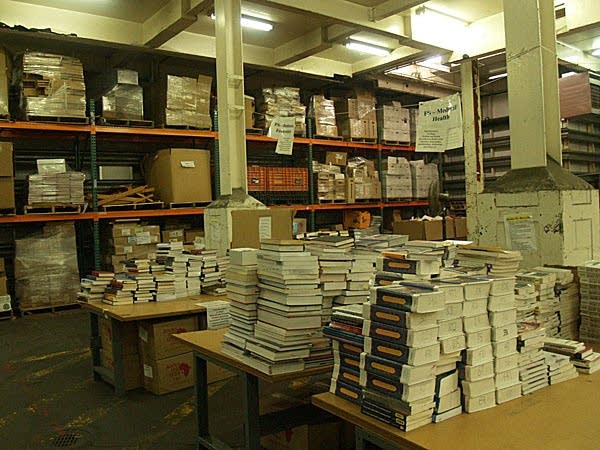Books, by the millions, for Africa
Go Deeper.
Create an account or log in to save stories.
Like this?
Thanks for liking this story! We have added it to a list of your favorite stories.

While many of us take books for granted, in some parts of the world they are still a rarity. A St. Paul-based organization is trying to change this by sending millions of books, most of them school textbooks, to Africa.
In what used to be the keg room at the old Hamms Brewery in St. Paul, April Gilbert leads some new volunteers through what is now the Books for Africa Warehouse.
"Post-secondary college math," she says. "Trigonometry, calculus, linear algebra, elementary, probability and statistics." She trips over the list. "I can't talk today," she laughs.
Gilbert, the warehouse manager, is pointing out sorting tables where neat piles of textbooks already stand ready for boxing. All round the side walls huge containers of books, all donated, sit awaiting sorting.
Turn Up Your Support
MPR News helps you turn down the noise and build shared understanding. Turn up your support for this public resource and keep trusted journalism accessible to all.
Books for Africa's Dan Gaardner shows the volunteers how that's done. It's more art than library science.
"It's a book about a nurse. You could either put in science, or there's a little margin for error. You don't have to be perfect," he said. "Kind of get it in the right grade level and we'll be in pretty good shape."

Huge numbers of volumes come in the front door, and then head out to Africa.
It's a simple idea, but according to Books for Africa Executive Director Patrick Plonski, it's effective.
"We are the largest shipper of school books to the African continent," Plonski says. "We have shipped 23 million books to 45 countries since 1988."
The organization started after founder Tom Warth came across an empty library in Uganda. He worked in publishing, and after returning to Minnesota, arranged for a shipment of books. That went so well, he launched Books for Africa to send more.
After sorting, the books are boxed by category, then placed on pallets.
"Our goal is to put ourselves out of business, and to end the book famine in Africa."
Plonski stands before a wall of neatly labeled pallets, ready to go in a container.
"This is approximately one shipment. This is 20 pallets of books. It's about 22,000 books. It's 20 tons of books," he says.
Seven or eight shipments a month this size leave St. Paul for Books for Africa's Atlanta warehouse. It then sends them on to their final African destinations.
The finance works like this: the books are donated, and the cost of the freight is paid by a sponsor in the recipient country. That sponsor also distributes the books after arrival.
Pat Plonski says much of his work is about logistics, making sure the right books go to the right place. Books for Africa recycles many of the donations, if they are out of date, or are too culturally specific to the United States to be of use in Africa.
"An example would be American history, or American civics, which would focus heavily on U.S. government," he says.

Plonski says they make special efforts to get college level books which are in high demand. They have forged agreements with Encyclopedia Britannica, with Thompson Reuters for law books, and are working with Merck to secure medical books.
It may be a long time in coming, but Plonski says Books for Africa has an end in sight.
"Our goal is to put ourselves out of business, and to end the book famine in Africa."
In a country like the United States, which can seem awash in books, the idea of a book famine is hard to grasp. But to Yves Zouzouambe, a member of the Cameroonian Networks of Minnesota who is volunteering as a sorter at the warehouse it makes sense. He says Cameroon is in good shape, and its people well-educated.
"But unfortunately there are some countries that need help," he says. "And that's why we are here to lend a hand."

Zimbabwean writer Alexandra Fuller puts it more forcefully.
"I think it's like air or water," she says. "When you have it you don't realize how life sustaining it is. But when you don't have books, the absence of it is tremendously crushing."
Fuller says supplying textbooks is important, but so is making sure other books are available.
"In my home country, Zimbabwe, not only can you not get my books, but you can't get the books of most other Zimbabwean writers," she says.
Fuller says having access to such work is important not just for a country to understand itself, but also where it stands with reference to the rest of the world.

Fuller will be the keynote speaker at a Books for Africa literary conference on Saturday in St. Paul, featuring writers from all over Africa coming to support the organizations work.
As he stands in the Books for Africa Executive Director Pat Plonski says what he does is hard work, but very satisfying.
"I have to confess, when I visit a school or library in Africa, I can't resist the urge, I pull the books out to see where they came from," he says. "And very often they came from Minnesota, some school that I know of. And it's very rewarding and fun to see that these books were donated by Minnesotans and here they are in some remote location in Africa."
Books for Africa is now working on a new challenge: a Nigerian sponsor is trying to arrange for a shipment of a million books.
Plonski is confident it can be done. All they need to arrange are the logistics.



